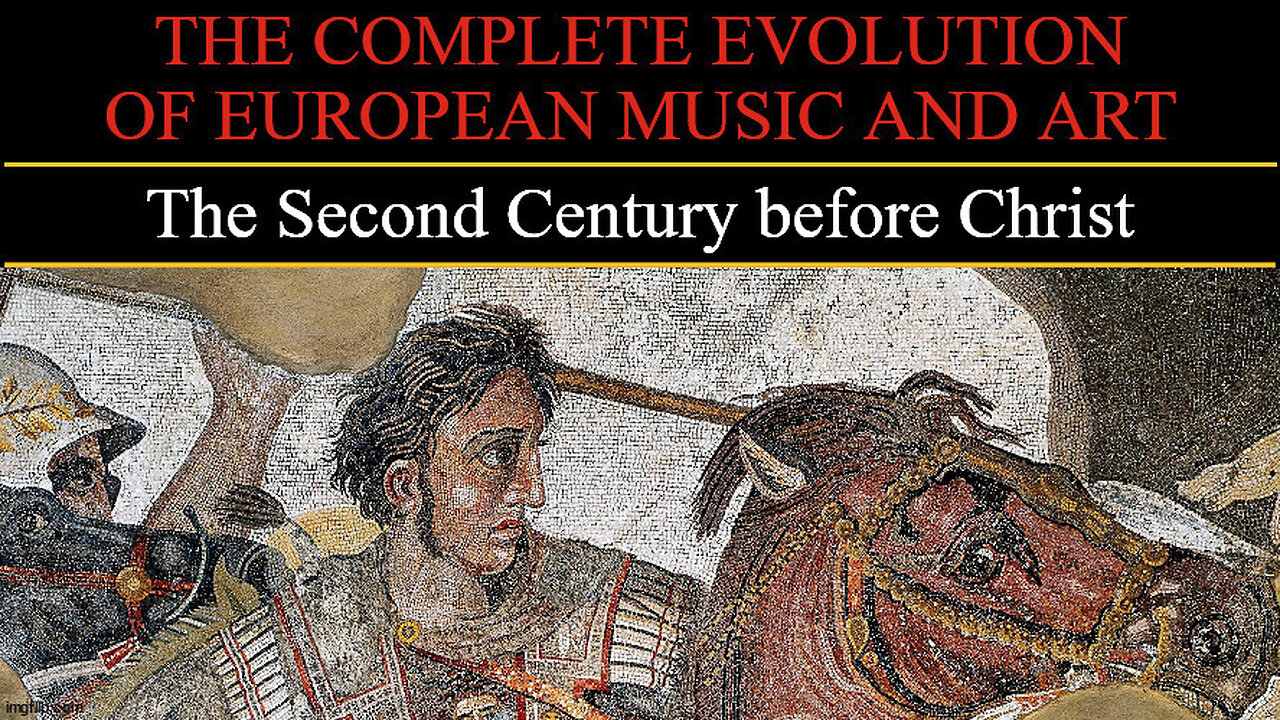Premium Only Content

Timeline of European Art and Music - The Second Century BC
Music timestamps (only two this time, spread out in replies)
0:00 - 133 BC - Athenios son of Athenios (Greek) - The First Delphic Hymn To Apollo
In the first verse verse the singers call on the Muses (goddesses of music and dance) to leave their home on Mount Helicon and to join in the song in honour of Apollo. This part has been translated by Armand D'Angour as follows:
"Hark, you whose domain is deep-forested Helicon, loud-thundering Zeus’ fair-armed daughters: come with songs to celebrate your brother Phoebus of the golden hair, who over the twin peaks of this mountain, Parnassus, accompanied by the far-famed Delphic maidens, comes to the streams of the flowing Castalian spring as he visits his mountain oracle."
The second verse describes the presence of the delegation from Attica and the sacrifice of Arabian incense and young bulls that they are making. It also mentions the sound of the pipes (auloi) and the lyre (cithara) accompanying the sacrifice.
"Behold, Attica with its great city (Athens) is at prayer, dwellers on the unconquered land of the armed Tritonian goddess (Athena); and on the holy altars Hephaistos (i.e. fire) consumes the thighs of bull-calves; and together with the smoke, Arabian incense rises to the heavens. And the shrill, blaring aulos weaves a melody with fluttering notes, and the golden, sweet-voiced kithara blends with the song of praise."
The third verse is rather fragmentary, with several gaps in the words and music, but enough survives to make sense of it. In this verse the singers address Apollo directly, and describe how he took over the prophetic tripod at Delphi after killing the snake that guarded it, and how once he thwarted an army of invading Gauls
5:00 - 128 BC - Limenios son of Thoinos (Greek) - Second Delphic Hymn to Apollo
The first verse -
"Come ye to this twin-peaked slope of Parnassos with distant views, [where dancers are welcome], and [lead me in my songs], Pierian Goddesses who dwell on the snow-swept crags of Helikon. Sing in honour of Pythian Phoebus, golden-haired, skilled archer and musician, whom blessed Leto bore beside the celebrated marsh, grasping with her hands a sturdy branch of the grey-green olive tree in her time of travail."
The hymn goes on to describe how the sky and sea rejoiced at Apollo's birth on the island of Delos, and how Apollo, after his birth, visited Attica; ever since which time the people of Attica have addressed Apollo as "Paian"
The final part of the work is the prosodion, or processional hymn, with the metre changing from cretic. In this part, the singers beg Apollo and his sister Artemis ("mistress of Cretan bows") to protect Athens as well as Delphi, and they close with a prayer for the continued dominion of the victorious Roman empire.
Both Delphic Hymns were addressed to Apollo, and were found inscribed on stone fragments from the south outer wall of the Athenian Treasury at Delphi (Greece).
-
 UPCOMING
UPCOMING
freecastle
5 hours agoTAKE UP YOUR CROSS- STOP the Hate From State to State!
871 -
 1:11:04
1:11:04
vivafrei
2 hours agoWhat Did Bongino See? The Epstein "Privilege"! Canada Has Become a Dangerous JOKE & MORE!
77.3K48 -
 2:07:48
2:07:48
The Quartering
4 hours agoToday's Breaking News With Josie The Red Headed Libertarian, Hannah Claire & Luke Rodkowski
111K24 -
 LIVE
LIVE
Akademiks
3 hours agoDrake Tries for another #1?? Kodak vs YB still? Ksoo gets snitched on. Doechii plz stop botting
1,151 watching -
 LIVE
LIVE
The HotSeat
1 hour agoHate Crimes In Cincy + Hiring A White Girl Makes You A NAZI?!?!
700 watching -
 25:24
25:24
Stephen Gardner
1 hour ago🔥 RFK Just SHUT DOWN a DISTURBING Problem!
9.35K9 -
 LIVE
LIVE
Film Threat
6 hours agoVERSUS: SUPERMAN VS. THE FANTASTIC FOUR | Film Threat Versus
103 watching -
![[Ep 715] The Trump Way: Deals & Peace | Hate Crimes – Brutal Beat Downs | CA Homeless Money Scam](https://1a-1791.com/video/fww1/f5/s8/1/6/3/j/6/63j6y.0kob-small-Ep-715-The-Trump-Way-Deals-.jpg) LIVE
LIVE
The Nunn Report - w/ Dan Nunn
1 hour ago[Ep 715] The Trump Way: Deals & Peace | Hate Crimes – Brutal Beat Downs | CA Homeless Money Scam
210 watching -
 2:36:55
2:36:55
Nerdrotic
7 hours ago $2.94 earnedCancel Kurtzman Trek | The Fate of the Superhero Film - Nerdrotic Nooner 502
43.7K2 -
 LIVE
LIVE
Viss
4 hours ago🔴LIVE - The Tactics That Lead To Consistent Wins in PUBG!
65 watching